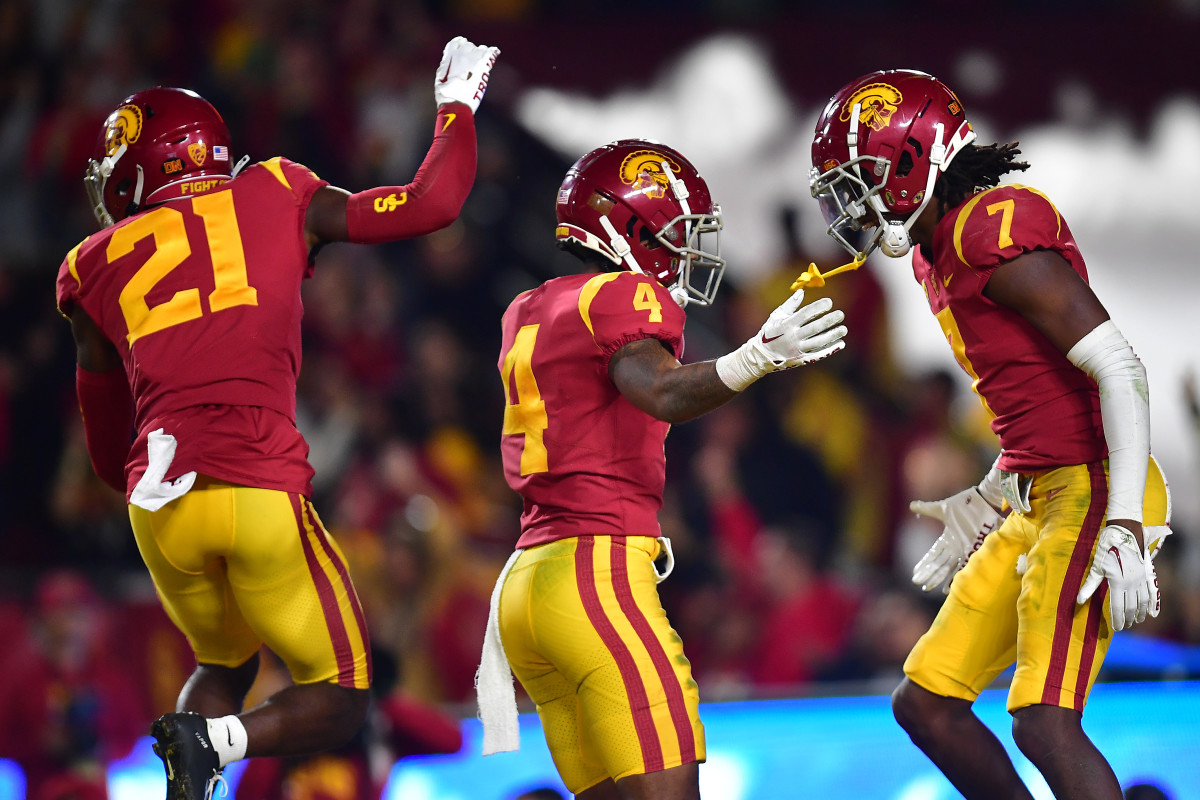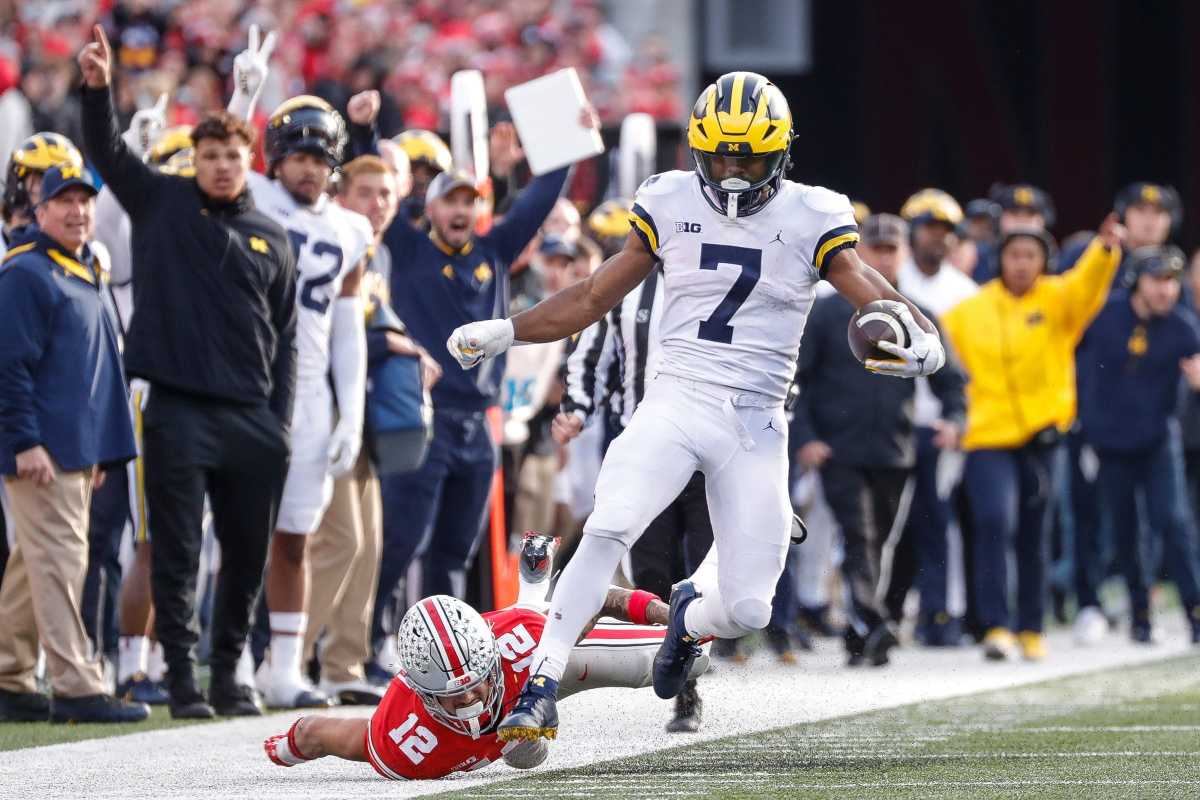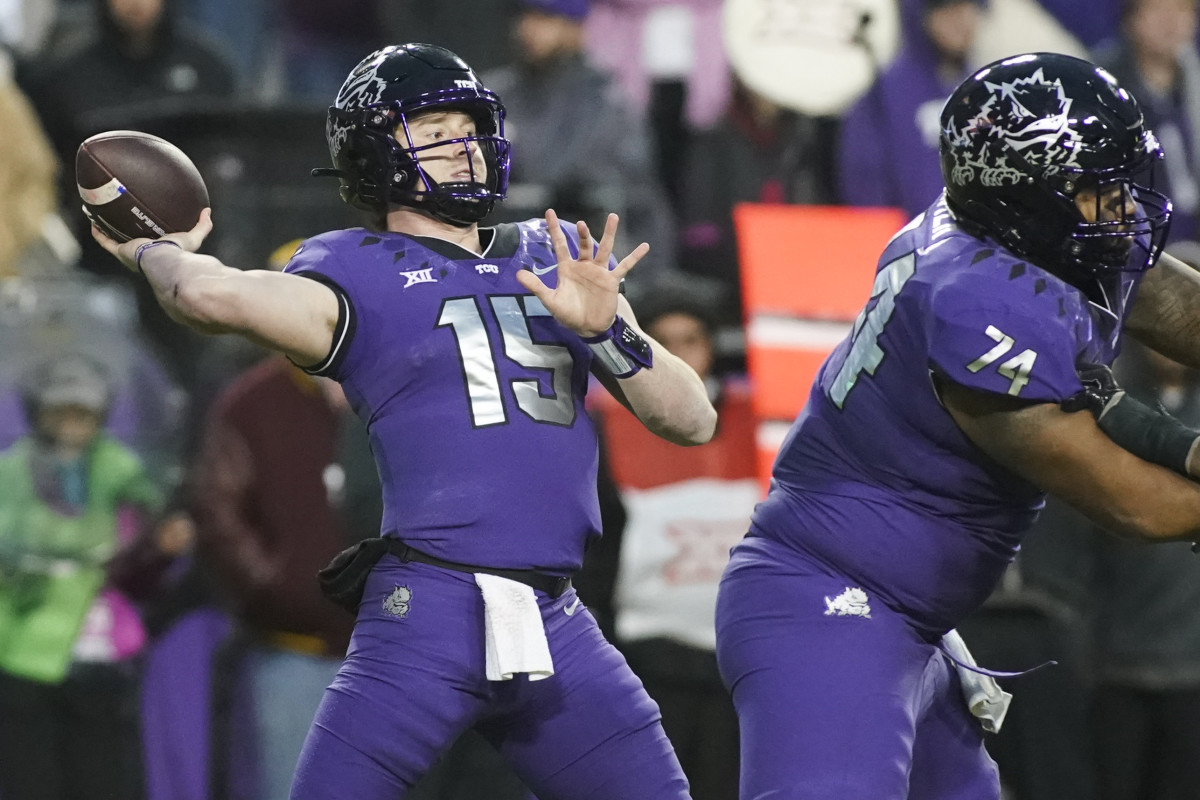Final Playoff Questions As Conference Title Games Threaten to Wreak Havoc on It All
Forty names, games, teams and minutiae making news in college football (humble pie, the Thanksgiving weekend dessert nobody wants, sold separately in Columbus):
MORE DASH: The Carousel’s Toll | Auburn Gonna Auburn | Title Game Picks
First Quarter
Conference Championship Games Are Here to Jeopardize the Playoff
Assuming the College Football Playoff selection committee sees things the same way as most of the rest of us (a risky assumption, admittedly), four teams have separated themselves from the rest of the nation. They are Georgia, Michigan, TCU and USC, and now, all four of them are tasked with playing conference championship games that can only hurt them, not help (1).
Georgia (12-0) takes on a three-loss LSU team in the SEC. Michigan (12-0) faces four-loss Purdue in the Big Ten. TCU (12-0) plays a three-loss Kansas State team it already has defeated once in the Big 12. USC (11-1) meets three-loss Utah, which it lost to by a point in Salt Lake City, in the Pac-12. Of that group, the Bulldogs, Wolverines and Horned Frogs are the three that could probably afford a loss and still make the playoff. The Trojans, with a presumptive No. 4 ranking from the selection committee come Tuesday night, would be at risk of losing a playoff spot if defeated by the Utes.
Who would be in line to move up with a USC defeat? Ohio State (11-1), last seen flopping spectacularly at home against Michigan, or perhaps Alabama (10-2), which probably counts 8-4 Texas as its best win. This is dumb on a number of levels.

The Buckeyes and Crimson Tide shouldn’t be able to benefit from sitting at home and playing one fewer game (2) because they weren’t good enough to win their divisions. USC shouldn’t be at greater risk because it was good enough to finish with the best record in its conference. But that’s how the nonsensical system operates: it’s better to avoid a game than to play one at this stage, if you’re in the playoff mix.
For years—decades, really—conference championship games have done little to serve the best interests of the best teams (3). Kansas State missed a shot at a national title in the BCS Era with an upset loss to Texas A&M in the 1998 Big 12 championship. Tennessee was similarly victimized by LSU in the 2001 SEC game. Last year, Cincinnati had to not only beat Houston in the American Athletic Conference title game but also sweat out a Baylor goal-line stand against Oklahoma State in the Big 12 game to hold onto the No. 4 playoff spot.
In addition to serving as double jeopardy for the best teams, most conference championship matchups aren’t very compelling games. The average margin of victory for Power 5 title games last year was 22.6 points, with only that Baylor-Oklahoma State game being decided by fewer than 17.
The best thing to do with conference championship games as we move into the 12-team playoff era is to fire them directly into the sun (4). Do away with them. Among other benefits, that would free up a week the playoff very much needs for the schedule to make optimum sense. It could either add some more breathing room to December as a buffer between the physical and academic grind of the regular season and the start of the postseason, or it could reduce the encroachment deeper into January and the conflict with the NFL playoffs.
Of course, that will never happen. Why? Conference championship games are big money makers: they produce robust TV ratings, they sell expensive tickets, they boost sponsorship commitments and they serve as promotional vehicles for the leagues. As is always the case in college football, profits are never taken off the table. Only additional influxes of cash are allowable, never reductions.
So we are stuck with problematic, repetitive, often non-compelling games ... the likes of which we will see this week. Georgia and Michigan both will be favored by more than two touchdowns. Clemson will be favored by at least a score over North Carolina in the ACC. The only close Power 5 spreads will be in the Big 12 and Pac-12, both of which will be rematches from earlier in the season.
And then we’ll see if the outcomes help someone from the outside—and sitting at home—back into the playoff. Not a great scenario.

Answering the Last Remaining Playoff Questions
Question No. 1: Who should be No. 1, Georgia (5) or Michigan (6)?
Answer: It’s still the Bulldogs, though the gap between the two is not wide. They’re a wash in terms of scoring margin: Michigan has outscored the opposition by 27.1 points; Georgia by 27.0. The ‘Dogs are outgaining opponents by 218.2 yards per game; the Wolverines by 196.9.
The difference comes in strength of schedule: the Sagarin Ratings put Georgia’s at 32nd in the country and Michigan’s at 56th. This is the last place where the Wolverines’ non-conference schedule can still come back and bite them. The Bulldogs have played 10 Power 5 opponents to the Wolverines’ nine, and one of their non-conference opponents (Oregon) has been ranked for many weeks.
Michigan’s two best wins—routs of Ohio State and Penn State—might weigh a little more heavily than Georgia’s routs of Oregon and Tennessee, but not by much. And the overall strength of the SEC is greater than that of the Big Ten.
Question No. 2: Has TCU (7) done enough to lock up a spot even if it loses Saturday?
Answer: Yes. Running the table in a quality conference has to count for something, especially when stacked up against what others have done. Sagarin rates the Big 12 slightly ahead of the SEC as the best league in the land, and while that’s debatable, it does reinforce the depth of the conference. With Kansas having drastically improved itself, there are no weak links in the 2022 Big 12. (Iowa State finished last, but six of its losses were by seven points or less.)
A loss to Kansas State at this stage would certainly carry no shame. The Wildcats (9-3) and Horned Frogs played a gripping game in Fort Worth in October, with TCU falling behind 28-10 in the second quarter before scoring the game’s final four touchdowns. At 12-1, the Frogs would have to be blown out to put their playoff spot at risk.

Question No. 3: What should be the ranking order Tuesday night between USC (8), Ohio State (9) and Alabama (10)?
Same as it is above: Trojans, Buckeyes, Crimson Tide. USC’s only loss is by a point on the road against a 9-3 team. The Trojans didn’t trail Utah until the final minute and led by two touchdowns on three different occasions. Victories over Oregon State (9-3), UCLA (9-3) and Notre Dame (8-4) add to the USC resume. Ohio State has a nice win over Penn State (10-2), and a win over Notre Dame (8-4) that is similar to USC’s but less dominant, plus its one loss was a whopper. Alabama has two losses to teams that have subsequently lost games in Tennessee and LSU, plus sketchy wins over Texas and Texas A&M and solid wins over Mississippi and Mississippi State.
Roll it all together and this is the current playoff structure according to The Dash:
Peach Bowl: top seed Georgia vs. fourth seed USC.
Fiesta Bowl: second seed Michigan vs. third seed TCU
MORE DASH: The Carousel’s Toll | Auburn Gonna Auburn | Title Game Picks
